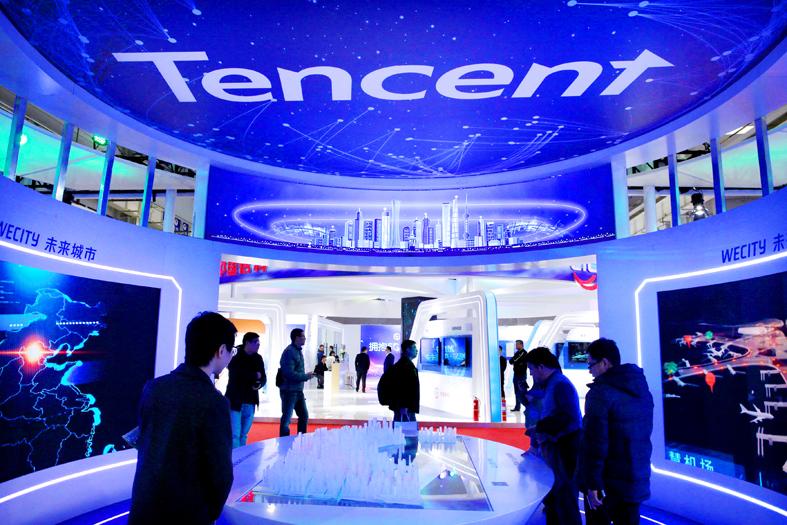Chinese authorities are considering requiring Tencent Holdings Ltd (騰訊) to include WeChat Pay in a newly created financial holding company, part of an overhaul that might necessitate a new license for the ubiquitous mobile payments service, people familiar with the matter said.
The potential move would present a fresh hurdle for Tencent, which along with other Internet firms was told last year to cordon off financial services from its main business.
Similar to requirements imposed on Jack Ma’s (馬雲) Ant Group Co (螞蟻集團), Tencent needs to fold its banking, securities, insurance and credit-scoring services into a financial holding company that can be regulated like a traditional bank, the people said.

Photo: Reuters
Regulators are now weighing whether WeChat Pay should be included in that holding company and operate separately from the main social media arm, the people said, asking not to be named discussing private deliberations.
While investors have long anticipated the financial services overhaul, details of how that impacts WeChat Pay — which handles billions of dollars daily, but is a transactional platform rather than a lender — have until now proven elusive.
Including WeChat Pay in the financial entity adds a new layer of uncertainty to the restructuring, because it is an integral feature of the WeChat super-app used by more than 1 billion people, relying on backend support from different divisions.
Any move that reduces the convenience of the service in Tencent’s mobile offerings risks chipping away at the one-stop-shop appeal that turned the Chinese firm into one of the world’s most valuable companies.
It might also revive investor angst about Beijing’s crackdown on technology companies.
Speculation that the nearly two-year campaign is nearing an end has helped stocks including Tencent rebound from multi-year lows this week.
Including WeChat Pay in the financial holding company would subject the service — and the vast reams of user data it generates daily — to the direct scrutiny of new regulatory bodies like the People’s Bank of China, with uncertain ramifications.
Ant’s estimated valuation has dropped to as low as US$63 billion from more than US$300 billion at its peak, in part because of the stricter regulations that come with being a financial holding company.
The mechanics of ring-fencing Tencent’s financial business — including interoperability between platforms — still need to be ironed out and arrangements could change, the people said.
One certainty is that a financial holding company would mean additional capital requirements and tighter regulatory scrutiny.
The Wall Street Journal this week reported that Tencent faces a record fine after Chinese authorities found WeChat Pay had contravened rules to prevent money laundering.
Tencent is expected to maintain control of the new finance arm, but one question is whether services accessed through WeChat must offer equal ease of access to Ant’s rival Alipay.
Regulators considered Tencent’s current payments license owned by its TenPay unit, the back-end provider of wallet services on WeChat and QQ, as insufficient to cover WeChat Pay’s services, the people said.

The Eurovision Song Contest has seen a surge in punter interest at the bookmakers, becoming a major betting event, experts said ahead of last night’s giant glamfest in Basel. “Eurovision has quietly become one of the biggest betting events of the year,” said Tomi Huttunen, senior manager of the Online Computer Finland (OCS) betting and casino platform. Betting sites have long been used to gauge which way voters might be leaning ahead of the world’s biggest televised live music event. However, bookmakers highlight a huge increase in engagement in recent years — and this year in particular. “We’ve already passed 2023’s total activity and

Nvidia Corp CEO Jensen Huang (黃仁勳) today announced that his company has selected "Beitou Shilin" in Taipei for its new Taiwan office, called Nvidia Constellation, putting an end to months of speculation. Industry sources have said that the tech giant has been eyeing the Beitou Shilin Science Park as the site of its new overseas headquarters, and speculated that the new headquarters would be built on two plots of land designated as "T17" and "T18," which span 3.89 hectares in the park. "I think it's time for us to reveal one of the largest products we've ever built," Huang said near the

China yesterday announced anti-dumping duties as high as 74.9 percent on imports of polyoxymethylene (POM) copolymers, a type of engineering plastic, from Taiwan, the US, the EU and Japan. The Chinese Ministry of Commerce’s findings conclude a probe launched in May last year, shortly after the US sharply increased tariffs on Chinese electric vehicles, computer chips and other imports. POM copolymers can partially replace metals such as copper and zinc, and have various applications, including in auto parts, electronics and medical equipment, the Chinese ministry has said. In January, it said initial investigations had determined that dumping was taking place, and implemented preliminary

Intel Corp yesterday reinforced its determination to strengthen its partnerships with Taiwan’s ecosystem partners including original-electronic-manufacturing (OEM) companies such as Hon Hai Precision Industry Co (鴻海精密) and chipmaker United Microelectronics Corp (UMC, 聯電). “Tonight marks a new beginning. We renew our new partnership with Taiwan ecosystem,” Intel new chief executive officer Tan Lip-bu (陳立武) said at a dinner with representatives from the company’s local partners, celebrating the 40th anniversary of the US chip giant’s presence in Taiwan. Tan took the reins at Intel six weeks ago aiming to reform the chipmaker and revive its past glory. This is the first time Tan